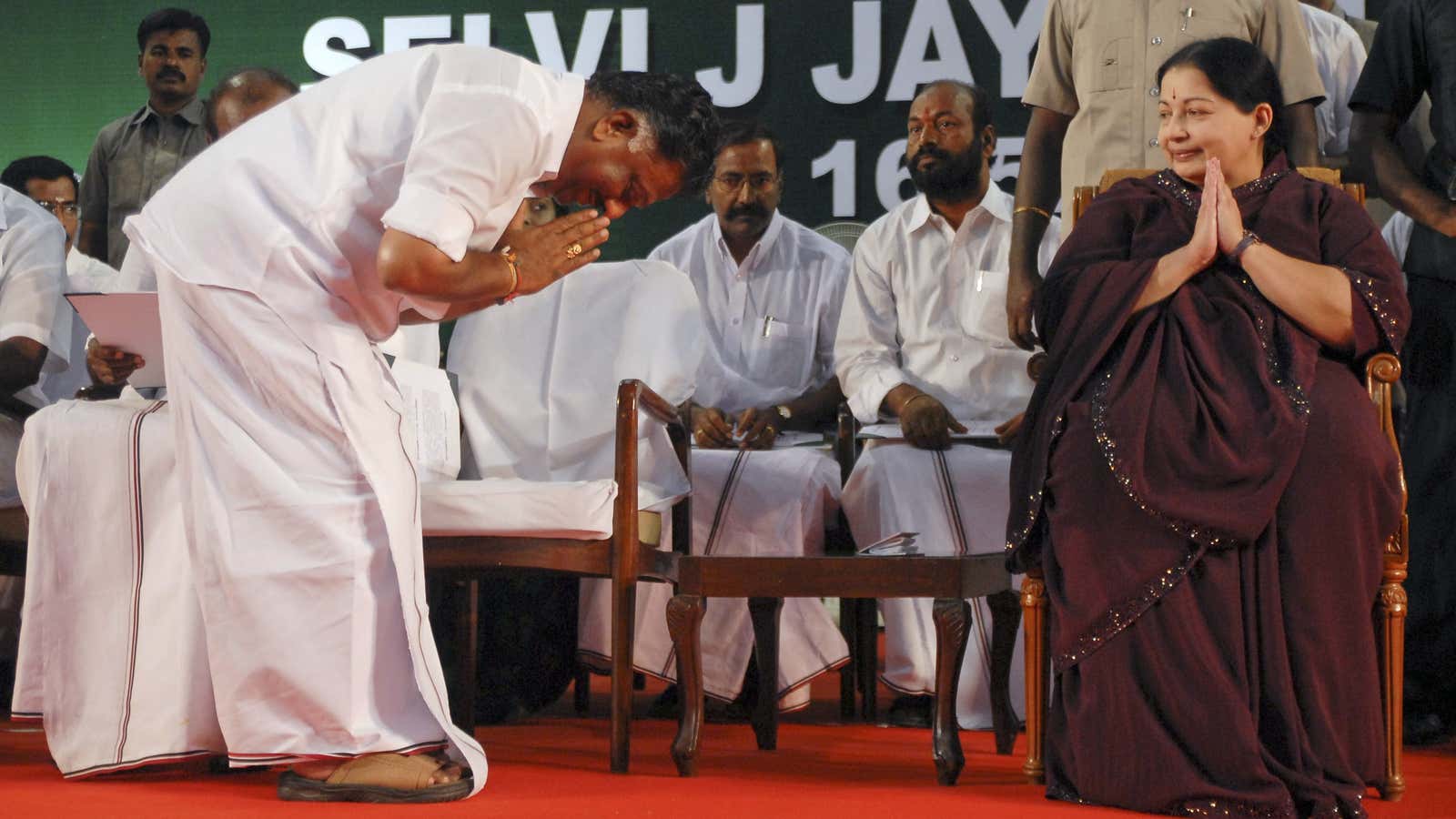It was never going to be easy for her even with a mentor like the colossal Marudur Gopalan Ramachandran, popularly known in moviedom, as well as politics, as MGR.
So, Jayalalithaa Jayaraman had to turn into the authoritarian leader that she is known to be today to negotiate the chauvinistic political landscape before her.
“Jayalalithaa’s absolute intolerance to criticism and dissent is very close to being a fascist, but one should remember that she was also a victim of the macho male world of politics,” said Leena Manimekalai, a poet and filmmaker based in Chennai, the capital of Tamil Nadu. ”That (her authoritarianism) was an oppressor syndrome… Victims wanting to be the oppressor.”
That’s because the film star-turned-politician’s rise has been a tale of battling perennial abuse—physical, verbal, and mental. It began almost immediately after MGR’s passing in 1987 when she was assaulted and pushed off the gun-carriage carrying his body by a relative of the deceased chief minister.
However, nothing played more of foundational role in her political career as the outrageous episode in the Tamil Nadu assembly in March 1989. While there are multiple versions of what happened, the dominant narrative involves her attempted disrobing by a member of the M Karunanidhi-led Dravida Munnetra Kazhakam (DMK).
The infamous event followed the violence inside the House between members of her party, the All India Anna Dravida Munnetra Kazhakam (AIDMK), and those of the DMK. Eyewitnesses say that Karunanidhi, then the chief minister, threw expletives at her after she called him a kutravali, a criminal in Tamil. In the ensuing violence, she was physically attacked even though a few members tried to protect her. Just as she was leaving the assembly, Durai Murugan, a minister in the DMK government, attacked her. The loose end of her saree was pulled out in that assault, marking perhaps the most shameful episode in Tamil Nadu’s modern political history.
Jayalalithaa, then 40 years old, compared her plight to that of Draupadi, the mythical character from the Mahabharata epic. In that tale, the wife of the Pandava brothers is disrobed publicly by her husband’s vengeful cousin looking to humiliate them through her.
Murugan and others have consistently denied her narrative, claiming that Jayalalithaa was exaggerating to evoke sympathy.
However, the fact is that she girded herself for the long run on that fateful March day. In MGR’s shadow till then, she set off on her political journey in all earnestness.
As a disheveled and distraught Jayalalithaa left the Tamil Nadu state assembly that day, utterly humiliated, she reportedly vowed to return to the hall only once it could ensure the dignity of women.
Two years down the line, she unseated Karunanidhi as chief minister and swept to power.
“Yes, she was wronged, by every other force in this unequal society… She made all of them fall at her feet,” said Manimekalai. Not a huge fan of hers or her authoritarian style of governance, Manimekalai, however, confesses to enjoying Jayalalithaa’s “dynamic presence beyond all my reasoning and critical point of views.”
Manimekalai says that the late chief minister’s story is very similar to that of “most of our country goddesses (who) are women marred by misogyny.” “The more she was insulted and disgraced, the more powerful she soared. She picked up every stone thrown at her and laid her foundation,” Manimekalai said. “I doubt if a woman can sustain and survive in this macho world without being authoritarian.”
Jayalalithaa learnt that lesson early, and learnt it well.
We welcome your comments at ideas.india@qz.com.
